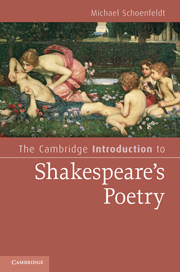Book contents
- Frontmatter
- Contents
- Acknowledgments
- Chapter 1 Shakespeare and English poetry
- Chapter 2 Shakespeare's banquet of sense
- Chapter 3 Constraint and complaint in Lucrece
- Chapter 4 Mysteries of the Sonnets
- Chapter 5 Time and mortality in the Sonnets
- Chapter 6 Friendship and love, darkness and lust
- Chapter 7 Solitary and mutual flames
- Chapter 8 Fantasies of Shakespearean authorship
- Notes
- Further reading
- Index
- Cambridge Introductions to Literature
Chapter 5 - Time and mortality in the Sonnets
Published online by Cambridge University Press: 05 June 2012
- Frontmatter
- Contents
- Acknowledgments
- Chapter 1 Shakespeare and English poetry
- Chapter 2 Shakespeare's banquet of sense
- Chapter 3 Constraint and complaint in Lucrece
- Chapter 4 Mysteries of the Sonnets
- Chapter 5 Time and mortality in the Sonnets
- Chapter 6 Friendship and love, darkness and lust
- Chapter 7 Solitary and mutual flames
- Chapter 8 Fantasies of Shakespearean authorship
- Notes
- Further reading
- Index
- Cambridge Introductions to Literature
Summary
Tombs die too.
– Roland BarthesThe ruination of time is not a subject unique to poetry. Indeed, one of the central themes of love poetry – carpe diem, seize the day, for tomorrow we die – derives its energy and persuasiveness from the inevitable passing of youth. But Shakespeare's particular angle on time and its relationship to poetry and desire must have struck the first readers of the Sonnets as an odd, if not a radical, variation on a conventional theme. Time is an important if intermittent issue in the first 126 sonnets. The word itself is mentioned 78 times. But with one notable exception, it is hardly present at all as a theme or issue in the last 28 poems. Time is for Shakespeare rarely imagined as healing or redemptive (although the late romances, and The Winter's Tale in particular, will engage with the possibility that intense suffering over substantial chunks of time might merit some qualified forgiveness for truly horrible acts). Rather, time in the Sonnets is a force that ravages beauty and destroys objects of love and desire. It even threatens the immaterial substance of memory, which is precariously lodged in the heart and brain of creatures whose fragile bodies are subject to temporal dissolution.
Time and progeny
The first nineteen sonnets focus on the precarious and ephemeral beauty of an aristocratic young man, and worry about the toll that time will take on his physical charms.
- Type
- Chapter
- Information
- The Cambridge Introduction to Shakespeare's Poetry , pp. 69 - 87Publisher: Cambridge University PressPrint publication year: 2010



